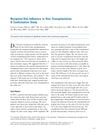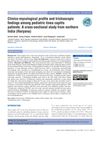 3 citations,
January 2019 in “Journal of Cutaneous and Aesthetic Surgery”
3 citations,
January 2019 in “Journal of Cutaneous and Aesthetic Surgery” Scalp and beard hair survive best in hair transplants, but the procedure needs high skill and takes longer.
[object Object]  7 citations,
July 2014 in “Facial Plastic Surgery Clinics of North America”
7 citations,
July 2014 in “Facial Plastic Surgery Clinics of North America” Different ethnic hair traits must be considered for successful hair restoration surgery to achieve natural-looking results.
 3 citations,
August 2011 in “InTech eBooks”
3 citations,
August 2011 in “InTech eBooks” The document concludes that skin grafts are essential for repairing tissue loss, with various types available and ongoing research into substitutes to improve outcomes and reduce donor site issues.
 16 citations,
April 2009 in “Dermatologic Surgery”
16 citations,
April 2009 in “Dermatologic Surgery” The place where hair is transplanted can change its growth rate and length but not its thickness.
 14 citations,
June 2019 in “BMC infectious diseases”
14 citations,
June 2019 in “BMC infectious diseases” A rare fungal infection on a child's scalp was successfully treated with antifungal medication.
 8 citations,
April 2009 in “International journal of oncology”
8 citations,
April 2009 in “International journal of oncology” Hair follicle cells resist turning into skin cells.
 3 citations,
January 2012 in “Elsevier eBooks”
3 citations,
January 2012 in “Elsevier eBooks” The document says that there are treatments for hair and nail diseases.
118 citations,
January 2013 in “Biomaterials” Keratin from human hair shows promise for medical uses like wound healing and tissue engineering.
 25 citations,
December 2008 in “Journal of Dermatological Case Reports”
25 citations,
December 2008 in “Journal of Dermatological Case Reports” In vivo reflectance confocal microscopy is useful for evaluating hair shaft diseases but needs improvement for deeper hair follicle issues.

Selenium can be toxic to animals, causing serious health issues, especially in horses.
 March 2020 in “Journal of Laser Applications”
March 2020 in “Journal of Laser Applications” Photobiomodulation therapy significantly increases hair density and growth for androgenic alopecia, but more research is needed to confirm safety.
 66 citations,
July 2015 in “Journal of Molecular Biology”
66 citations,
July 2015 in “Journal of Molecular Biology” The document concludes that for hair and feather growth, it's better to target the environment around stem cells than the cells themselves.
 1 citations,
July 2016 in “Elsevier eBooks”
1 citations,
July 2016 in “Elsevier eBooks” Understanding skin structure and development helps diagnose and treat skin disorders.
69 citations,
April 2010 in “Clinical ophthalmology” Bimatoprost is effective for growing longer, thicker, and darker eyelashes.
 2 citations,
July 2023 in “Agronomy”
2 citations,
July 2023 in “Agronomy” Melatonin helps wheat plants resist drought by improving their root and root hair growth.
 1 citations,
July 1965 in “Postgraduate medicine”
1 citations,
July 1965 in “Postgraduate medicine” Most skin conditions can be managed with general medical knowledge.
 2 citations,
March 2023 in “BMC ecology and evolution”
2 citations,
March 2023 in “BMC ecology and evolution” Some hair protein genes evolved early and were adapted for use in hair follicles.
 6 citations,
January 2016 in “Annals of Dermatology”
6 citations,
January 2016 in “Annals of Dermatology” Human hair contains more glycosaminoglycans in children than adults, and these compounds decrease with age, possibly affecting hair thickness.
 May 2023 in “Stem cell research & therapy”
May 2023 in “Stem cell research & therapy” New method efficiently isolates hair growth cells from newborn mouse skin.
 November 2023 in “Cureus”
November 2023 in “Cureus” Magnetized saline water lotion increased hair growth in men with hair loss.
 July 2024 in “Journal of Cosmetic Dermatology”
July 2024 in “Journal of Cosmetic Dermatology” Vegan collagen builder improves hair growth, skin smoothness, and reduces wrinkles and pain.
 1 citations,
October 2022 in “Asian journal of medical sciences”
1 citations,
October 2022 in “Asian journal of medical sciences” Trichoscopy is a valuable, quick, and non-invasive tool for diagnosing tinea capitis in children.
 January 2012 in “Elsevier eBooks”
January 2012 in “Elsevier eBooks” Hair transplantation is highly effective with careful technique and attention to patient needs.
 47 citations,
January 2013 in “International Journal of Cosmetic Science”
47 citations,
January 2013 in “International Journal of Cosmetic Science” Hair diversity is influenced by complex genetics and environmental factors, requiring more research for practical solutions.
 3 citations,
January 2020 in “Clinical dermatology review”
3 citations,
January 2020 in “Clinical dermatology review” Trichoscopy is useful for diagnosing hair and scalp disorders in people with darker skin.
 January 2017 in “Journal of Cosmetics, Dermatological Sciences and Applications”
January 2017 in “Journal of Cosmetics, Dermatological Sciences and Applications” Chinese women's hair gets thinner and grayer with age, and scalp conditions change, especially after 40.
 25 citations,
May 2019 in “Heliyon”
25 citations,
May 2019 in “Heliyon” Hair treatments cause significant structural changes, especially with excessive heat, regardless of ethnicity.
[object Object]  11 citations,
January 2023 in “BioMed Research International”
11 citations,
January 2023 in “BioMed Research International” Microbial biosurfactants could be a safer and environmentally friendly alternative to chemical surfactants in cosmetics.
Current hair regeneration methods show promise but face challenges in maintaining cell effectiveness and creating the right environment for hair growth.
 January 2022 in “Journal of Dermatology and Dermatologic Surgery”
January 2022 in “Journal of Dermatology and Dermatologic Surgery” Trichoscopy is useful for quickly diagnosing different types of hair loss without needing biopsies.


























